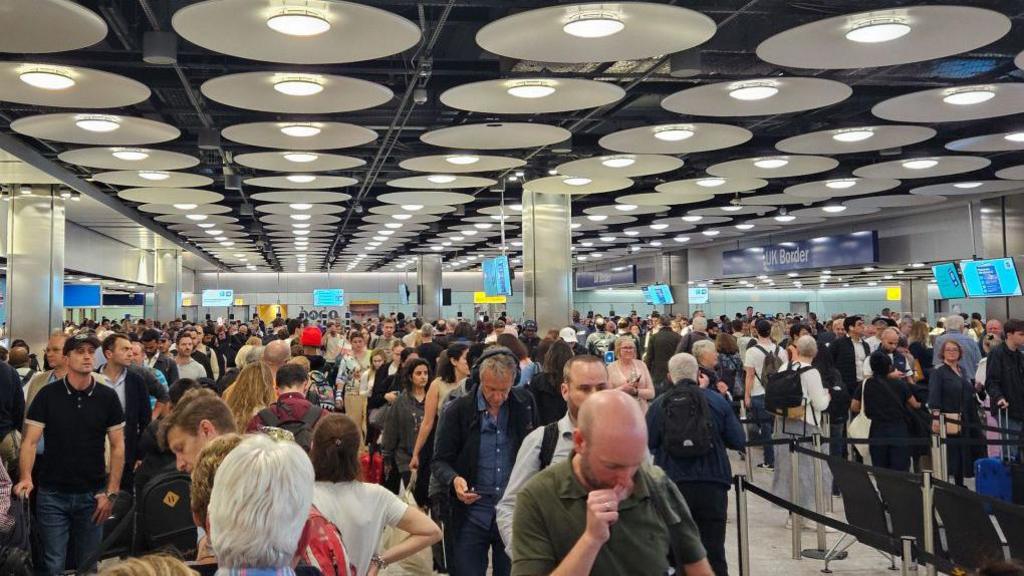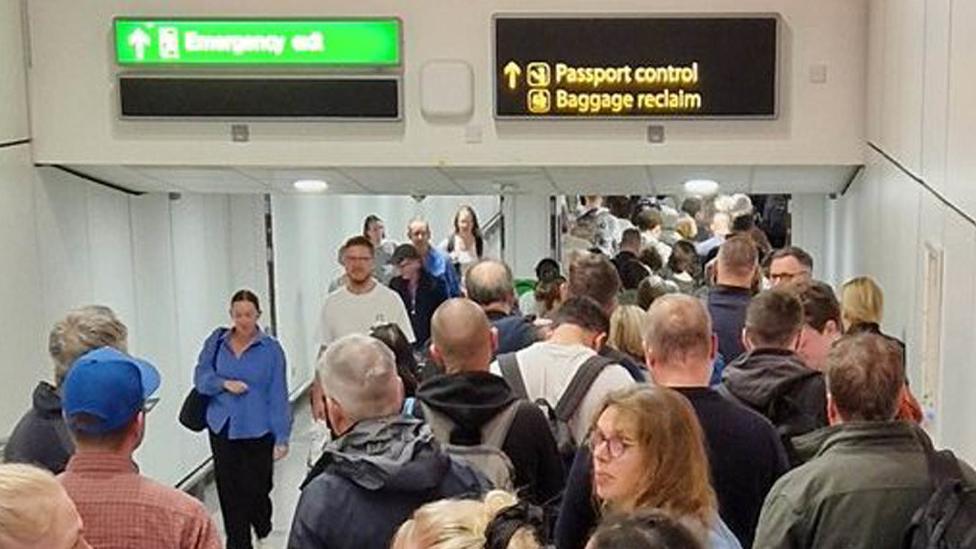E-gate outage lessons 'must be learnt'

- Published
The government must learn lessons from a nationwide failure of passport control e-gates at UK airports on Tuesday, a peer has warned.
The technology failure, which affected major UK airports including Heathrow and Gatwick, is "deeply concerning", Lord Foster of Bath said.
A border staff union member called for better contingency planning.
The Home Office said "at no point was border security compromised".
Thousands of passengers faced hours of queues on Tuesday evening after a technology failure.
The BBC understands that a "network routing issue" was the cause of the outage.
The glitch also affected other border security systems, according to the Immigration Services Union.
In some locations staff were able to use laptops, and in others the desk systems could access a back-up database, according to Lucy Moreton, a professional officer with the union.
Lord Foster, who chairs the Lords Justice and Home Affairs committee, said: "Technology invariably fails, but the e-gates systems have experienced a number of problems recently," he said.
The last major e-gate outage was around the late May bank holiday in 2023.
Lord Foster called for Border Force staff to be "equipped and trained to deal with such situations".
He added that "resilience in our systems is essential" given the UK is preparing to roll out the new Electronic Travel Authorisation (ETA), a permit which non-British and non-Irish citizens who do not require a visa will generally need to enter the UK.
"The government must get the fundamentals right - and it must be prepared to learn the appropriate lessons when things go wrong," Lord Foster said.
Ms Moreton said this is third time there have been significant problems with e-gates in three years.
Every time this has happened, the union has asked the Home Office "to ensure there are proper contingency plans in place", she said.
"We're assured that they are there, but then the next time the gates go down, it's evident that there just simply isn't the infrastructure, or the staff any more, to try and process people through the border while maintaining border security," she said.
She added that security is "paramount" and "that's what results in the queues".
"We can't throw the border open and just let people through without checking them," she said.
The knock-on effects on baggage collection and the rest of people's journeys is "horrific", she added.
Ms Moreton said the glitch on Tuesday hit the e-gates and "turned them off", but also hit the electronic system border staff use.
She said border staff get pulled off other duties such as checking for drugs to get people through the border "as quickly as they can".
Julia Lo Bue-Said, chief executive of independent travel agent industry group The Advantage Travel Partnership, said that there "needs to be sufficient investment in the technologies used in travel to ensure that these systems run smoothly".
She added that there needed to be "robust contingency plans in place to avoid any unnecessary disruption to travellers".
The government is currently without a borders watchdog after the previous chief inspector of borders and immigration, David Neal, was sacked after he leaked details of reports that were critical of the UK borders system.
Mr Neal said he had decided to leak the reports because the government was not publishing them.
His latest report on e-gates, which he sent to the Home Secretary in June 2023, was not published until February 2024.
The report provided "a snapshot of a system nowhere near that envisaged by the UK Border Strategy 2025", he wrote.
The report found that deployment of staff and resources was "inconsistent", and that staff suffer from "a lack of basic communication equipment".
The Home Office was approached for comment, but previously said of the e-gates incident that "as soon as engineers detected a wider system network issue at 19:44 last night, a large scale contingency response was activated within six minutes".
"At no point was border security compromised, and there is no indication of malicious cyber activity," a spokesperson said.
Related topics
- Published8 May 2024

- Published20 February 2024
